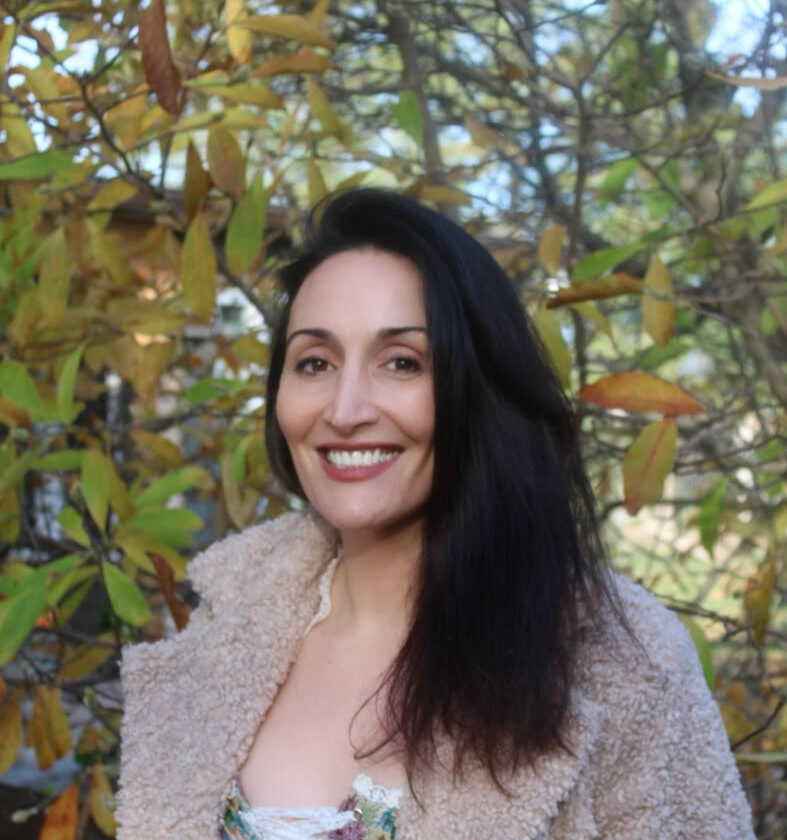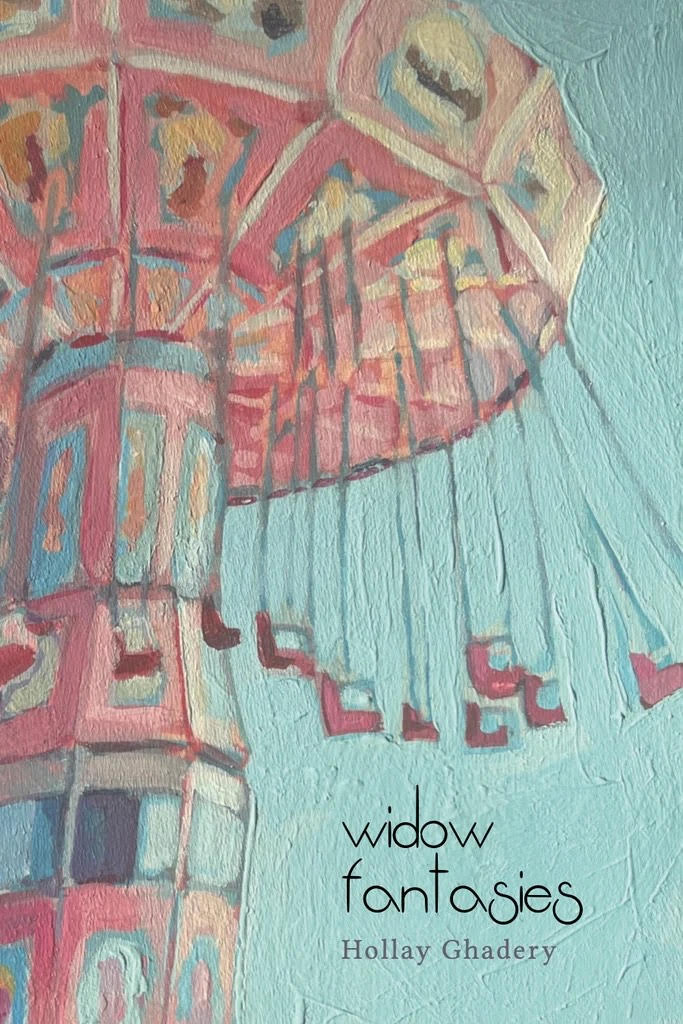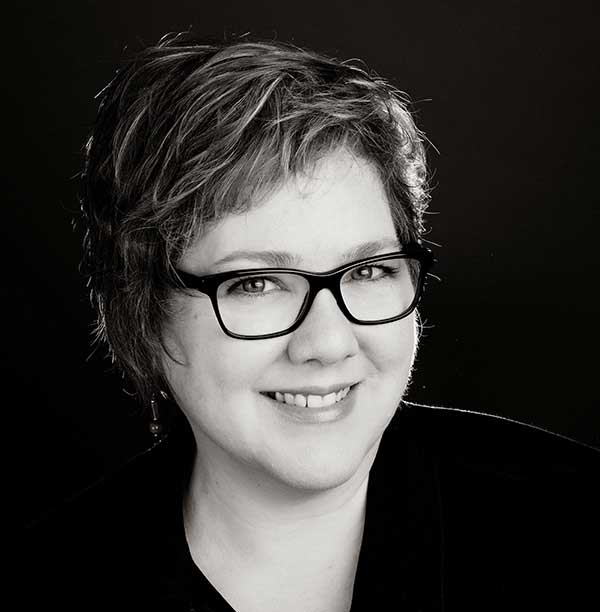Launched: Widow Fantasies by Hollay Ghadery
By Laura Rock Gaughan

Hollay Ghadery is a multi-genre writer living in Ontario on Anishinaabe land. Fuse, her memoir of mixed-race identity and mental health, was released by Guernica Editions in 2021 and won the 2023 Canadian Bookclub Award for Nonfiction/Memoir. Her collection of poetry, Rebellion Box was released by Radiant Press in 2023, and her collection of short fiction, Widow Fantasies, was released with Gordon Hill Press in September 2024. Her debut novel, The Unraveling of Ou, is due out with Palimpsest Press in 2026, and her children’s book, Being with the Birds, with Guernica Editions in 2027. Hollay is the host of The Neighbourhood Bookclub on 105.5 FM, as well as a co-host HOWL on CIUT 89.5 FM. She is also a book publicist and the Poet Laureate of Scugog Township. Learn more about Hollay at www.hollayghadery.com.
Q: The 33 stories in Widow Fantasies are all short yet deeply immersive flashes of experience. As a writer, what does this form demand from you that is different from your poetry, CNF, or longer form fiction? Technically, emotionally, or both.
These stories hinge on distillation, much like a poem, but also need to have a story’s narrative arc, so I definitely found the collection at times, challenging to write—despite the fact I was drawn by the form because I thought it would be easier to tackle with four young children milling round and a busy household to run.
To an extent, I was right. Short, short stories like mine don’t demand that I become absorbed in another world and a long involved plot like a novel would. I could draft a story in a couple hours. Finish it in a week or two. But because I felt compelled to tell stories—to speak in voices outside my own and give into narrative—I couldn’t fall back on poetry, which is my default setting. I needed to take my head out of the ether, at least a little bit, and ground myself in some semblance of narrative structure, even if it was to challenge that narrative structure. My stories ask readers to consider that even stories we tell each other in a quick minute are complete stories. Brevity says something about who and where we are in our lives and ourselves. I am reminded of women in a play group I used to attend with my babies. We’d converse in these frantic little bursts. That’s all the time we had before a tiny hand was tugging on our pants with a request, or a baby was fussing and needed to be whisked away for a diaper change or nap, or a call came from the school because an or older child had an accident at recess and needed to be picked up, or a partner was bringing home guests for dinner and we had to leave now, and attend to the rest of our lives.
I understand not everyone will know what this experience is like; trying to relate a story quickly, breathlessly, because you know you will be interrupted at any second. I understand the form of these stories might challenge some readers. Still, there is a precious desperation to this sort of narrative, and I felt compelled to try to capture it.
And it was, at times, fun to try to capture it. Unlike my creative nonfiction writing, for instance, these stories have roots in conversations I’ve had with other women and slivers of my own life, and it was enjoyable to dress them up and show them to the world. I didn’t feel that exhausting mining of self I encounter when I write nonfiction.

Q: The topics treated in this book range from relationship conflict to bodily functions to tender and angry moments in parenting, to loss and impending loss, and beyond. The stories are vivid, intimate, and varied, with revealing details about characters’ lives, particularly the women and girls. Do you have any favourites?
I do have favourites! I love “Jaws”, because it is very much based in my life and an attachment I formed to a Nowruz goldfish. (Though not all details of that story are rooted in my life.) I also love “Structural Integrity”, because it examines internalized misogyny in a horrifically embarrassing way. “Purple Bears” is a family favourite. My kids love it since the story captures the ferocity of a mother’s love at odds with trying to do what’s “right” and “expected” for a mother to do.
I also love the story about the man with the hard arteries. A dear friend gifted me a detail of her parents’ marriage and allowed me to use it for this piece. This friend said she would never write of it, and I could. It is such an honour, to be trusted this way, with something so private.
Q: With the book out now and some distance from the drafting and revising, are there any stories in this collection that you might revisit in a new longer work? Or is it the case that once you’re done with them, you’re done?
In a sense, I already have. The story, “TikTok Virgin”, which captures a woman beginning to question her sexuality during middle age, is the basis of the novel I wrote which was recently accepted for publication with Palimpsest Press —just like the poem in my poetry collection, “Psychomachia”, became a creative catalyst for Widow Fantasies. I don’t seem to know it at the time, but whatever I work on now seems to bleed into what I work on next, in some way. There’s always some unfinished business in my mind.
Q: The epigraph is from a poem by Sarah Venart, called “When in Pompeii”. It reads: “I can’t save all of myself. But perhaps / what is most precious might be / perhaps, perhaps preserved.”
Can you talk about what drew you to these lines? Are the stories in Widow Fantasies an act of preservation, or a way to save oneself?
Yes, Widow Fantasies is about preserving and valuing the stories of women, in any form they take. I ask readers to let go of rigid narrative scaffolding and consider that there may be other (totally valid and compelling) ways to tell stories.
Q: Switching topics to publishing: in addition to being a multi-genre writer, you are a busy publicist. You work with a lot of authors and presses. What is the most important advice for authors to help maximize publicity for a new book these days?
I have some long-run and short-run advice. Long-run first: Build a community. An authentic community. By “authentic” I mean surround yourself with people you admire, not people who you think might be of use to you. If you don’t admire another person’s work, supporting it is going to feel pretty soul destroying. And it helps if you don’t view your support as transactional.
How does uplifting other writers who may or may not get behind your work help your books? Because the community you are building isn’t necessarily with those authors. Or only those writers. It’s with other people with similar interests like booksellers, book clubs, readers — anyone who is literary-arts-adjacent and who loves this art form. These are people you can learn from and who can help you grow. There are no guarantees, but I do know that we can’t complain that no one reviews books anymore or shows up to our events if we don’t review books and show up to events ourselves. And we can’t belly-ache that no one values the arts if we aren’t celebrating the arts in our daily lives. By being a part of the community, and celebrating authors and books you enjoy, you are creating a buzz around literary culture that will benefit you. Just don’t expect instant gratification. You have to be ready to play the long game, to put yourself out there, and above all, be genuine.
My short-run advice: build your own platform. The media landscape is changing and arts spaces in traditional and earned media spaces have shrunk. More people are vying for limited spots in book review sections and air space on radio shows. It’s wonderful to land spots within these spaces but don’t depend on it. Advocate for yourself with new media platforms. Get active on social media, start a blog and a newsletter, check out podcasts (though don’t necessarily start one unless you have the gumption for it). I’d love to write in a cottage in the woods with ivy climbing the walls and never think about publicity. I’d love my books to magically sell themselves. That’s simply not how it works.
Q: You have two more books coming out in rapid succession—a novel in 2026, and then a children’s book in 2027. So, I hesitate to ask what’s next, because that’s already a lot, but any hints of what you’re working on or planning?
I am back to working on poetry, a collection of occasional verse that examines how we commemorate the passing of time, with a focus on how people who are neurodivergent experience time differently. The project is pretty new now, and in its sapling stage, but I hope it will start coming together. At present, I am just enjoying coming back to poetry, which always feels less demanding than fiction.

Laura Rock Gaughan is the author of Motherish, a short story collection. Her fiction and essays have appeared in Canadian, Irish, and US journals.
Photo by Katsiaryna Endruszkiewicz on Unsplash

